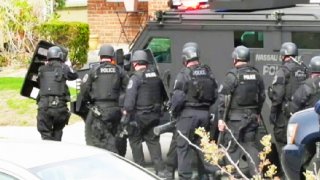
Ijeoma Oluo was boarding an early morning flight at Boston’s Logan Airport when she got a call from a number she didn’t recognize. A 911 dispatcher from Washington state was on the line: someone had reported a double murder at the author and activist’s home.
Oluo was almost certain she’d just been “swatted,” meaning someone had made a false report of extreme violence at her residence to prompt an overwhelming response by law enforcement. The term comes from the acronym for the Special Weapons and Tactics (SWAT) teams that deal with active shootings, armed robberies or hostage scenarios.
Oluo told the dispatcher her 17-year-old son was home alone, and that no guns were in the house. Even so, she panicked. Having written about encounters between police and people of color, she was acutely aware of what could go wrong.
“I was terrified they were going to come in guns blazing. I was bawling,” she said. “To send cops to the home of a black person — expecting dead bodies and guns — is really risking someone’s life.”
Anyone with a grudge and someone’s address can make a ‘swatting’ call, but what was once a niche prank played by gamers has become a favored means of terrorizing famous, controversial and vulnerable people. It has also become more organized in recent years, with online forums and chat rooms dedicated to targeted attacks on individuals, including YouTube personalities, tech executives, activists, authors and journalists.
Read more at NBC News.

